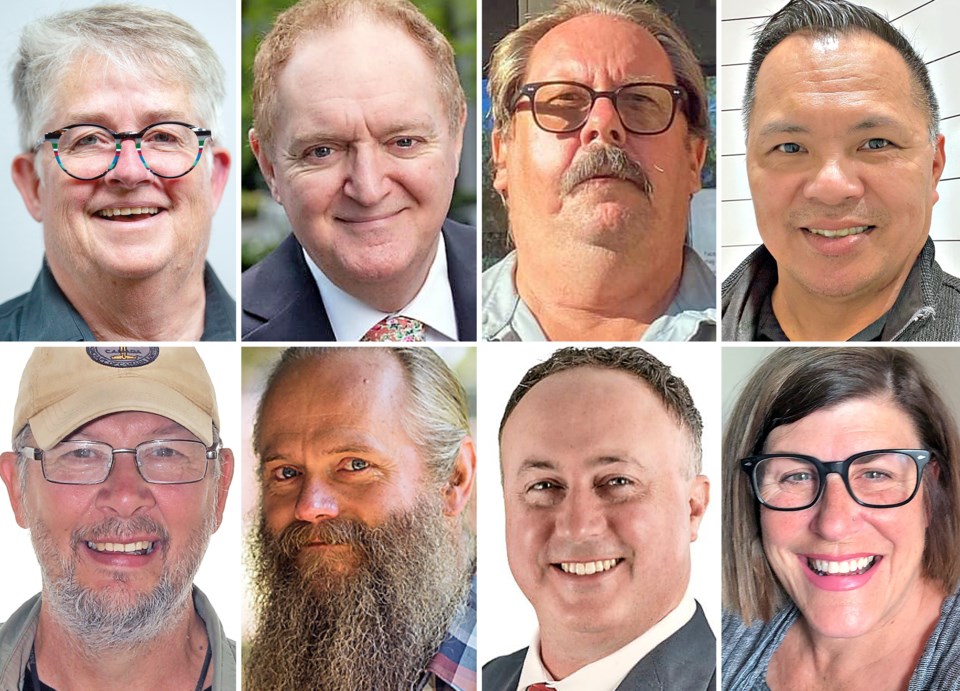With just over a week to go before the municipal election and so many candidates on the ballot, Victoria voters are still waiting to see which candidates will pull away from the pack and distinguish themselves.
But so far in this campaign that has not been easy.
Because there are 37 candidates vying for a seat on council and eight people competing for the mayor’s chair it’s difficult to be heard, said University of Victoria political science professor Michael Prince,
“It’s a real challenge,” he said, noting he expects that to translate into more signs hitting the boulevards in the final week leading up to voting day Oct. 15.
“It’s hard to think there could be more signs out there in some parts of the CRD but some candidates have limited budgets and some may be trying to hold off on the signs until maybe the last week or so to kind of get a push,” he said. “That could be part of the strategy or tactics that candidates use.”
Many will also rely on getting their views out via the old-fashioned door-knocking strategy and engaging in as many candidates’ debates and meetings as they can.
The all-candidates meetings, like this week’s mental health forum, offered a chance for councillors to field questions and expand on their own platform points, but do little in the way of stimulating debate and helping candidates distinguish themselves from the pack.
Wednesday morning’s mayoral debate on CFAX, however, did provide a bit more back and forth, though it fell short of fireworks and rousing debate.
The event showcased five of Victoria’s eight mayoral candidates – Marianne Alto, Stephen Andrew, Brendan Marshall, Lyall Atkinson and Rafael Fuentes – and featured mild sparring over where loyalties lie, the homeless question and housing.
Marshall seemed keen to paint both Alto and Andrew, who are councillors, as being left-wing candidates, noting Andrew seems to have changed allegiances since he was first elected in a byelection in 2020 as his current campaign manager has left-wing ties.
Andrew countered he was there to represent all residents and would like to see the divisiveness dropped from municipal politics.
Andrew chose to ask Marshall how he could put Victoria first as he lives and works in Esquimalt, though it was more likely Andrew was setting himself up to deliver the line: “I was born in United Kingdom, but I’m not running to be prime minister. I’m running to be mayor of Victoria. I live with the issues and the decisions that I make at the council table.”
Marshall, co-owner of the The Sunnyside Café, said he was born and raised in Victoria and that what happens in Victoria doesn’t just stay in Victoria.
“Victoria is my hometown, Victoria first and foremost and to suggest that that I shouldn’t be running here is absurd,” he said.
Broad answers were the norm during the question-and-answer sessions. But all five took more pointed stances when CFAX moderator Ryan Price asked where they stood on the missing middle housing initiative and how they would slow the increase in property taxes.
On the missing middle initiative, which would make it easier to build a wide variety of housing and increase density, Fuentes said he would vote against it as it does not deal with affordability, Atkinson said developers need to provide more affordable options, and Marshall said he supported blanket zoning to give developers more certainty.
Andrew said in its current form the policy is divisive and needs work.
“There are many aspects of it that I like, but it’s dividing the community and any policy that divides the community certainly is bad policy,” he said.
Alto said she still supports the policy, which came to council for approval last month after two and a half years of public engagement.
She said because council put off a decision until the new council is elected, Victoria actually gave away its authority to manage land use.
“Even when we had been advised repeatedly by the provincial government that if we didn’t actually engage something like missing middle, they would impose something on us. And a few days later they did,” she said, noting David Eby, who is campaigning to replace John Horgan as leader of the NDP and premier, recently laid out a housing plan that is “much more dramatic than what we were proposing.”
As for how to deal with rising property taxes, the answers all boiled down to reining in spending or having to make choices when it comes to budget items.
>>> To comment on this article, write a letter to the editor: [email protected]




